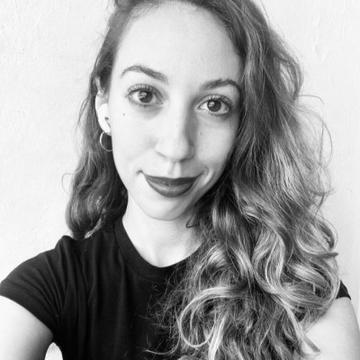Jasmine Anouna, founder of Bloom

Jasmine Anouna is the founder of The Bloom, an online hub for aspiring changemakers around the world – in her own words, ‘a global home for social impact.’ As the name suggests, The Bloom aims to cultivate a blossoming community with the common passion to bring about positive change, through meaningful cross-cultural connections. Subscription to The Bloom’s weekly newsletter promises access to job postings, exclusive interviews, mentorship programmes, event invitations, articles, podcast recommendations and everything in between – all curated with a focus on intersectionality, climate justice and feminism; each one a hopeful seed to begin your journey to making a real impact, on a local and global scale. Founded in 2020, The Bloom is a space for sharing inspiring media which brings people together from across the globe in discussion around social causes, how to work collaboratively and creatively and ways to maintain a sense of well-being and fulfilment.

In 2019, after I had completed my master’s degree in Gender Studies at the University of Oxford, I was looking for the next step. As an Italian-Egyptian-American, fluent in 4 languages, I had always dreamt of working for the United Nations, because a role there would intersect with many of the areas I am passionate about: diplomacy, international relations, human rights and Law. While still in Oxford, I applied for over 40 internships, before I was offered my ideal job at the UN office in Geneva, Switzerland. However, after three months, although I was really enjoying the work I was doing, I noticed this homogeneity in the stories of the people around me. Everyone I spoke to had grown up dreaming of working in the UN but had very little awareness of the social impact organisations that were active in their local areas or how to have a career alongside their quest for doing good. I saw so many talented, passionate young people around me who didn’t have the space to explore career options in the field of social impact, particularly those that would allow for their creativity to flourish. The Bloom was founded as a resolution to this. It provides a space where anything related to social impact work– niche Facebook groups, under-recognised changemakers etc. – is collated. Most of the information on social impact work is often scattered across the web, and many don’t have the time to spend four or five hours scrolling in search of the ‘perfect role.’ So, I took the time, myself. I wanted The Bloom to not only provide easy access to a wide array of resources for social impact work but also a space where members of its community could actually see the positive change they’re helping to contribute to, on a local and international level.
What is your definition of entrepreneurship?
Entrepreneurship, for me, is all about mindset. I think it’s about embracing ideas quickly, giving yourself room for creativity – taking joyful jumps of experimentation and then quickly letting go. By that I mean, putting less pressure on the process of building, and more emphasis on enjoying that process.
How and when did you know your idea was good enough to develop it?
I actually started developing the idea while still working at the UN, from a storage cupboard at the office! Initially, it started out as a newsletter amplifying jobs that I was interested in myself, which I then circulated to around twenty people, purely leading with the spirit of generosity. The initiative only grew from there. I began curating information, looking into all the amazing businesses focused on doing good – resources and stories which were not just inspiring, but practical too, and sharing this information with others around me. Today, The Bloom is home to 30,000 people around the world. I never questioned my business proposition because the business itself epitomises my values. I like to think of it as the feeling of a friend ‘just looking out for you’ who wants you to live your dream life; to stay informed from a more intersectional perspective.
What would you say are the top 3 skills that needed to be a successful entrepreneur? Why?
Number one: creativity. Number two: focus. For number three, I’d say humility, but also self-compassion. Being kind to yourself is so important in general, but especially in this industry where you’re working for yourself.
What is your favourite part of being an entrepreneur?
I think it really just forces you into stripping yourself away from all of the noise. You have to focus on what you really want; who you really are. The best entrepreneurs are those who are radically themselves and live that out as they build. Entering into the world of entrepreneurship is the biggest accelerator for personal development because it forces you to have serious conversations with yourself about your style of working, how you react to failure, and how you react to problems that arise in work and that can be hard to face. But if you’re open to that, the process is so rewarding.
What individual, company or organization inspires you most? Why?
Two people, in particular, come to mind. Firstly, Naj Austin, the founder of Ethel’s Club and Somewhere Good, social community care spaces for Black and Brown people in the United States. I really admire how well-rounded and authentic she is, which is reflected in her work. Who she is isn’t any different to what she’s building. Her spirit of playfulness is very similar to the spirit of joy I try to embed into the editorial of the newsletter and the resources we find for it, and the overall process of creation. Secondly, I’d have to say Anne-Laure Le Cunff, the founder of Ness Labs, a newsletter focused on neuroscience and mental health – essentially, a newsletter for curious humans. She was the first person who showed me that newsletters could be a really amazing way to build a community.
What would you say have been some of your mistakes, failures or lessons learned as an entrepreneur?
One thing I can say I’m still learning to do is to care less…which is ironic because I’m in a profession which is all about care – caring for people, caring for the planet, and caring for systemic change. And by that, I mean to practise healthy habits in a space where it’s so easy to burn out since you get so hyper-focused on what you’re working towards. Taking the time to switch off and step away from your workspace is so important. Looking to the support networks around you, and practising mindfulness in nature – all these things are vital to finding a happy work-life balance. I think letting the failures affect the people around me was also a big thing. It’s such a rollercoaster, this process of building something. You become trapped in this cycle of feeling as though you’re not doing enough. It’s a kind of tunnel vision. All you talk about is the business and it can become all-consuming. On a separate note, I remember at the time when I was looking to hire a team, being stuck in a linear mindset. My investors, as is to be expected, wanted to pour funding into the product, whereas my focus was on financially supporting a team of people. It then dawned on me that, in the beginning, teams are built simply by finding people with a shared vision. Talking with others and asking for help and advice is exactly how you create a team and a community, which is exactly what The Bloom is all about.
How have you funded your ideas?
The Bloom is a bootstrapped company, meaning I invested some of my own money into it, generated from working part-time jobs. Otherwise, the funding has mainly come from sponsorship and impact advertising. Over 200 companies have shared job adverts through our hub.
If a new entrepreneur or startup came to you looking for entrepreneurship resources, where would you send them?
I think that you can learn a lot about business and start-ups through alternative, more creative sources. For example, ‘Braiding Sweetgrass,’ by Robin Wall Kimmerer, and Priya Parker’s ‘The Art of Gathering: How We Meet and Why It Matters’ are wonderful books about community-building. ‘Build The Damn Thing: How to Start a Successful Business If You’re Not a Rich White Guy’ by Kathryn Finney is another great read, and more specifically about start-ups. There are a few podcasts I can also recommend, not necessarily in the entrepreneurial space, but definitely very motivating. Krista Tippett’s ‘On Being’ is one of my favourites. ‘Meditative Story,’ by Thrive Global, contains meditations from big CEOs, in which they walk you through a very personal anecdote from their life. ‘How To Own the Room’ is a fantastic podcast led by Viv Groskop, in which she talks to business leaders about skills such as self-confidence. That one is a really nice listen.
Have you faced any challenges as a woman entrepreneur? If so, how have you overcome them?
That sense of discomfort we feel around asking for help certainly comes to mind. While, on the one hand, it probably has to do with pride, on the other, it is very much a gendered issue. You want to be polite; you don’t want to cause any problems. I hate politeness. It’s so inconducive to growth. Ask for help and accept it. My biggest mental barrier was thinking that I had to do it all on my own. If you’re building something for others with the values of kindness and generosity at the heart of it, there will always be someone willing to help you in return. As a female entrepreneur, this feeling of restriction even extends to how we present ourselves in a networking setting. You dress how you think you should in order to be taken seriously. I even used to avoid wearing colour. In fact, the most important thing you can do as a woman in these spaces is to be yourself. The people I look up to the most are those who are unapologetically themselves, in every room.
Any last words of advice?
The best place to start is in your own story, your own frustrations and how you would go about innovating a way to create change. In that respect, your best resource is yourself. The other piece of advice I would give is to listen more than you speak. When you’re building something, it’s important to stay connected to who you are building for and to be humble. Listening is the most powerful way to do this, for sure.
Share this
More news



